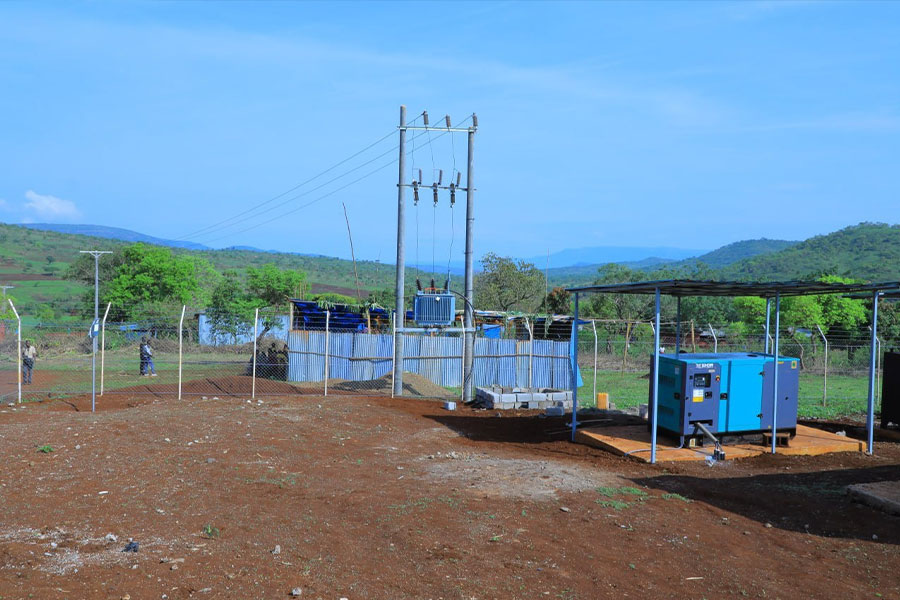
View From Arada | Aug 13,2022
Legal experts drawn from federal agencies, including the ministries of Finance and Revenues, are drafting legislation to tax transactions made on e-commerce platforms.
The bill's authors contemplate broadening the tax base, incorporating e-commerce business at a time of shrinking tax revenues due to pandemic, runaway inflation, civil war, and political instability. These have depressed economic activities and led the federal government to a 40 billion Br loss in taxes last year.
“Over a quarter of the tax revenues planned for this year would not be collected,” Finance Minister Ahmed Shide told Parliament, defending the budget bill passed last week.
The federal budget assumes revenue growth of 37pc from last year to reach 439 billion Br. Close to 28pc of the revenues is planned to come from income tax, and 45 billion Br (10pc) from value added tax on services. Eyeing a budget deficit of 309 billion Br, the authorities are determined to boost tax revenues by widening the tax base. Minister Ahmed told Parliament that his Ministry planned to apply new taxes, such as on properties.
Value-added tax (VAT), a consumption tax levied on imported goods, domestic services, and sales, is the government’s primary revenue source. It accounted for 21pc of the 279 billion Br collected by federal tax authorities last year. Officials plan to increase the share of VAT to 25pc this year. VAT is applied as an indirect tax at different levels of production and distribution – end users ultimately shoulder it.
While the existing tax regime is primarily territorial, flourishing tech companies operate in a mostly tax and duty-free environment, resulting in revenue losses to the government. Cepheus Capital, a private equity firm, counted nearly 200 e-commerce and e-classified companies operating in Ethiopia. The absence regulatory framework governing acceptable records of where goods are delivered, invoices issued, and payments made electronically have been tax authorities’ challenge to pulling e-commerce into the tax net.
The law governing VAT does not recognise transactions facilitated through digital platforms due to the absence of provisions defining what constitutes a permanent establishment for electronic-based transactions. The law and the tax apply only to transactions conducted in physical places such as offices, factories, and stores. The provision applies to traditional brick-and-mortar companies. Dotcom firms that conduct business mainly through websites and digital platforms without a permanent address can avoid tax liabilities.
The bill, which recognises e-commerce platform operators as legal entities, dictates all establishments operating as e-commerce service providers undergo business registration as legacy companies. Thus far, e-commerce operators have had to register under different subsectors or work informally.
Zmall is one of these companies. Incorporated two years ago, it operates through a grocery shopping and food delivery application, partnering with close to 150 supermarkets, suppliers and shops. It charges between 60 Br and 450 Br depending on the distance, according to Abiy Mekonnen, general manager.
Zmall facilitates 2.4 million Br of transactions annually.
It is forced to operate under its parent company, ETTA Solutions Plc, for there is a legal void in registering companies like Zmall without having a physical address. Incorporated in 2016, ETTA Solutions is a tech company developing taxi-hailing applications. The company is also behind Shekla, the music player and store application.
Officials have been legislating a series of laws in preparation for what is yet to come.
The Ministry of Innovation & Technology is drafting an e-transaction ordinance to regulate online businesses and their sectoral associations. The regulation is in the works a year after the legislation of a proclamation that governs the trade of goods and services over the internet and the transfer of money and data through e-transactions.
The tax bill proposes categorising digital services and supplying electronic content under the service sector. A lack of clarity in outlining the categorisation of e-commerce has been a stumbling block for companies like Asbeza, a grocery shopping platform launched two years ago.
Incorporated with an initial capital of 200,000 Br, Asbeza delivers groceries to clients online. It operates in partnership with close to 10 supermarkets and charges a five percent commission. However, its operations have been impeded by the absence of tax jurisdiction rules.
“We’ve been facing difficulties when we go to a tax office to declare our taxes,” said Bereket Tadesse, general manager of Asbeza.
Dessalegn Woldeyesus, an authorised accountant, urged officials to focus on the lack of skilled workforce needed to monitor e-commerce transactions within the tax offices.
“It requires a different set of skills to manage the accounts of e-businesses,” he said.
It is not the first for the government to amend the proclamation introduced in 2002, replacing sales tax with VAT. Three years ago, Parliament ratified an amendment that reduced the time companies with over 70 million Br in annual turnover must declare VAT three to four times a year.
PUBLISHED ON
[ VOL
, NO
]

View From Arada | Aug 13,2022

Radar | Oct 27,2024

Radar | May 31,2025

In-Picture | Mar 02,2024

Delicate Number | May 31,2025

In-Picture | Jul 06,2025

Radar | Nov 16,2024

Radar | Oct 27,2024

Fortune News | Apr 20,2019

Advertorials | May 15,2023

Dec 22 , 2024 . By TIZITA SHEWAFERAW
Charged with transforming colossal state-owned enterprises into modern and competitiv...

Aug 18 , 2024 . By AKSAH ITALO
Although predictable Yonas Zerihun's job in the ride-hailing service is not immune to...

Jul 28 , 2024 . By TIZITA SHEWAFERAW
Unhabitual, perhaps too many, Samuel Gebreyohannes, 38, used to occasionally enjoy a couple of beers at breakfast. However, he recently swit...

Jul 13 , 2024 . By AKSAH ITALO
Investors who rely on tractors, trucks, and field vehicles for commuting, transporting commodities, and f...

Nov 1 , 2025
The National Bank of Ethiopia (NBE) issued a statement two weeks ago that appeared to...

Oct 25 , 2025
The regulatory machinery is on overdrive. In only two years, no fewer than 35 new pro...

Oct 18 , 2025
The political establishment, notably the ruling party and its top brass, has become p...

Oct 11 , 2025
Ladislas Farago, a roving Associated Press (AP) correspondent, arrived in Ethiopia in...